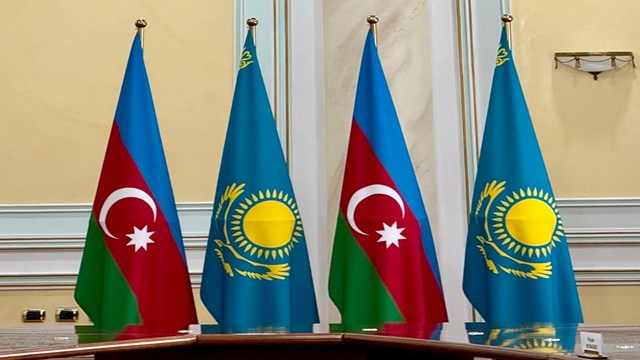
Kazakhstan and Azerbaijan aim to increase the cargo volume transported across the Caspian Sea to 10 million tons.
Kazakhstan and Azerbaijan aim to increase the cargo volume transported across the Caspian Sea to 10 million tons.
Kazakhstan and Azerbaijan, which aim to increase the cargo volume transported across the Caspian Sea to 10 million tons, have stated that they are working together on the Trans-Caspian International Transport Corridor, one of the key routes of the Middle Corridor.
Azerbaijani Foreign Minister Jeyhun Bayramov, who was in Kazakhstan for official talks, met with Kazakh Deputy Prime Minister and Foreign Minister Murat Nurtleu in the capital, Astana. After the face-to-face and delegation-level meetings, Nurtleu and Bayramov signed an action plan for the years 2025-2026 between the two countries' foreign ministries.
The two ministers held a joint press conference after the meeting. Kazakh Deputy Prime Minister and Foreign Minister Nurtleu emphasized that Kazakhstan and Azerbaijan share similar positions on international issues and stated, "There are no unresolved issues between our countries." He also pointed out that trade between the two countries has increased fivefold in recent years, and that in 2024, bilateral trade reached $533 million. "We agreed to raise this figure to $1 billion," he added.
Nurtleu expressed Kazakhstan’s readiness to increase grain exports to Azerbaijan and noted that there are currently 1,518 Azerbaijani companies operating in Kazakhstan, making Azerbaijan one of the top 10 countries with the most companies in Kazakhstan. He also stressed the strategic importance of cooperation between Kazakhstan and Azerbaijan in the Caspian Sea. He continued, "We are working together to increase the potential of the Trans-Caspian International Transport Corridor. Last year, the cargo volume transported across the Caspian Sea reached 4.5 million tons. We aim to increase this to 10 million tons in the future."
He also highlighted the successful cooperation between the two countries in the supply of Kazakh energy resources to foreign markets, adding, "We plan to increase the amount of Kazakh oil delivered to foreign markets via the Baku-Tbilisi-Ceyhan pipeline from 1.4 million tons per year to 2.2 million tons."
Nurtleu thanked Azerbaijan for its support in transporting raw uranium via the Caspian Sea and noted the importance of transporting Kazakh energy resources across the Caspian.
Azerbaijani Foreign Minister Bayramov thanked the Kazakh government and people for their support following the tragic crash of an Azerbaijan Airlines passenger plane near Kazakhstan’s Aktau city on December 25, 2024. He remarked that the shared brotherhood, common language, traditions, and culture unite the peoples of Azerbaijan and Kazakhstan, emphasizing that mutual respect and trust-based relations have been established between the two countries' presidents.
Bayramov also discussed cooperation within various international and regional organizations, particularly the Turkic Council, and expressed appreciation for efforts to strengthen the organization’s role on the international stage.
He concluded by stating that the "action plan" signed today covers cooperation in various fields and that increasing the potential for economic cooperation is crucial. "Expanding cooperation on the Trans-Caspian International Transport Corridor, an integral part of the Middle Corridor, and building a fiber-optic line across the Caspian Sea will bring dynamism to our relations," he added.
Bayramov reminded that Kazakhstan provided a platform for peace negotiations between Azerbaijan and Armenia in May 2024 and updated his Kazakh counterpart on the peace process.
President Tokayev’s Reception Azerbaijani Foreign Minister Bayramov was received by Kazakh President Kassym-Jomart Tokayev. During the meeting, Tokayev emphasized the importance of the visit in advancing cooperation with brotherly Azerbaijan, stating, "Our relations with Azerbaijan are of great importance. We consider your country a reliable strategic partner and ally."